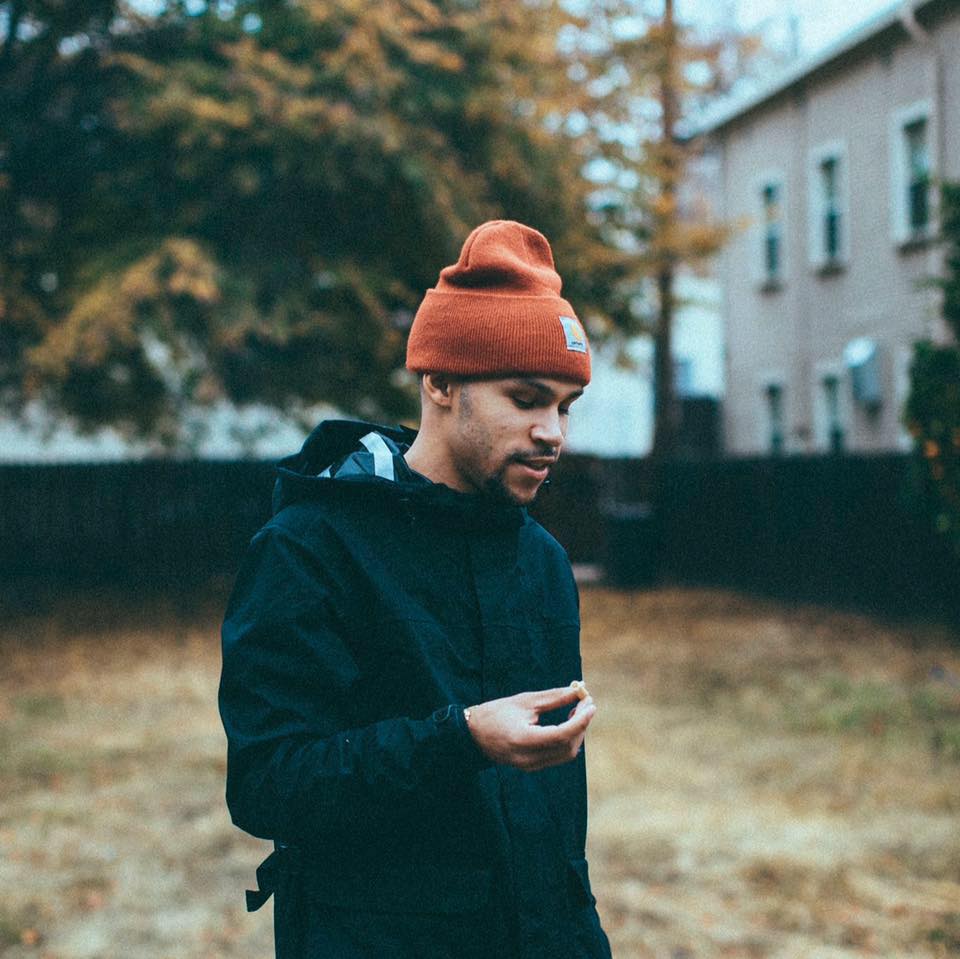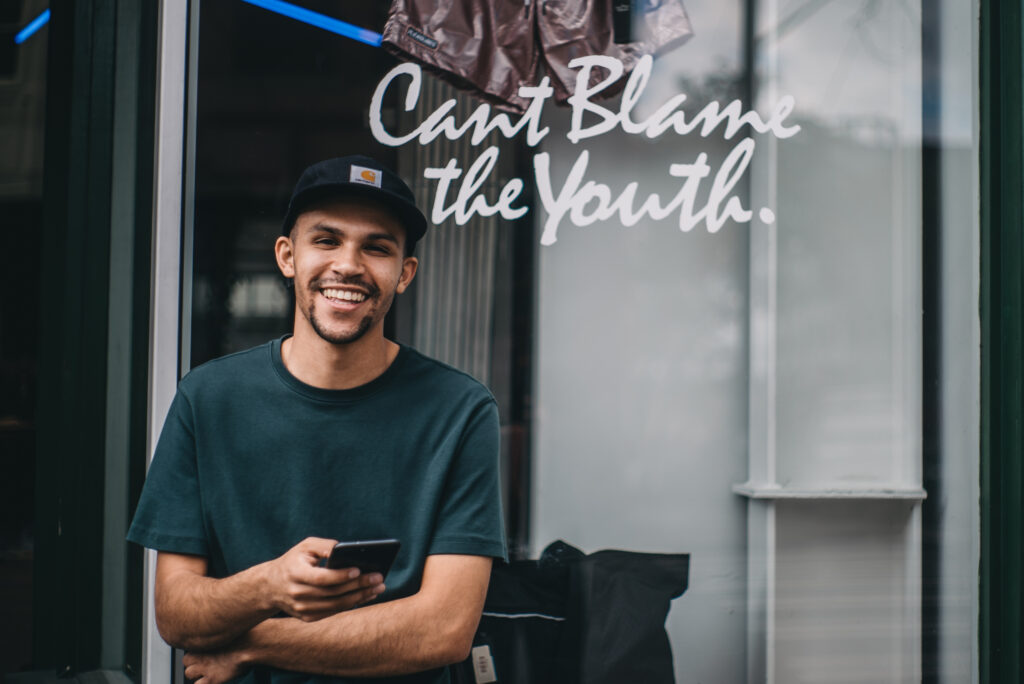Artist Home Interview: Shelton Harris on Managing Travis Thompson and Building a Fan Base

If you’re a fan of the Seattle music world, you’ve likely heard the name Travis Thompson in the past year, or so. He’s the bombastic rapper who, still in his early 20s, has played Late Night With Jimmy Fallon, collaborated with Macklemore, Sir Mix A Lot and Geo, and headlined the Showbox. But a name you might not know quite as well – but one that is no less significant – is Shelton Harris. He is Thompson’s manager and the person who has been with the burgeoning rapper every step of the way, from Burien to MTV.
We caught up with Harris to ask him how he got into artist management, what he’s learned along the way working with Thompson, and what his favorite memory is from the past year.
When did you starting working in artist management and what about it intrigued you?
I’d managed myself for my entire career as an artist, so I suppose that’s when I first started. That was from 2011-2016. I booked my own shows, uploaded my own music, submitted my own press, the whole nine yards. There was never a moment when I consciously decided to manage other artists. Travis was the first one, though, and even then it wasn’t intentional. I was simply Older Homie who had a car and could drive him to studio sessions. And if I had to say what intrigues me about it, it’s knowing that I’m allowing an artist to JUST be an artist.
When did you start working with Travis and what did you first see in him?
Travis started sending me music in early 2015. Not asking for anything other than my opinion. This was music he was recording by himself in his room. I remember what caught my attention early on was his ability to communicate a hyper specific emotion or experience. For example, lyrics about being at a party but all you’re doing is scrolling twitter. Collecting bus transfers so you didn’t have to pay every time. Stealing things but getting caught. Selling sneakers to make money. You don’t need to be from Burien or Seattle to resonate with those experiences. And even if you didn’t do them yourself, you absolutely had friends who did. And above all of that, he could rap in a way that was catchy enough to hit rewind.

A lot of Travis’ success has happened online thanks to some loyal fans and some great hustling. How did he set out to build an online fan base?
I’d say Travis’ strongest traits are consistency and the ability to recognize a moment you can capitalize on. I’d say first and foremost the most important thing you can do early on as an artist is create. You don’t have to put out everything you make, but if you KEEP making things (shout out Dylan Fout) there will inevitably be gems within them.
Travis got his first taste of internet success when his super creative, one-take Video for “Horchata” released on YouTube. It went to the front page of Reddit because people couldn’t believe that a kid who looked like “this” made music like “that.” The video went viral and racked up several hundred thousand views. From there he realized that the most impactful thing he could do with the music was create captivating visuals, which is something he never stopped doing.
Eight months after that moment, he delivered his first ever full project, Ambaum, which was incredibly well received by his new-found fan base.
How do you try to balance online promotion and streams with street team efforts like selling merchandise and tickets person-to-person?
I think that’s a matter of knowing your fan base. You don’t get to choose your fans, they choose you. So it’s important to be aware of who’s listening to your music and what their habits are. Travis’ fan base is very diverse in age and geography so it’s hard to pinpoint a certain area of focus. Rather, we make sure that all areas are being given attention. In terms of “street team efforts” we don’t do a ton of that. I definitely sell tickets in person to whoever wants them because a lot of people prefer to spend cash and save money on fees. But in terms of promotion, we give his fans opportunities to interact with him via listening parties, pop-up shops and collaborations with local clothing brands like Can’t Blame the Youth.
You talked online about anxiety and panic attacks. Are these connected to your work in music?
Great question. For clarity, I do not suffer from panic attacks, but I do suffer from anxiety and occasionally experience moderate depression. They’re not so much directly related to my work in music, but it certainly doesn’t help! It probably comes from the fact that I hold such a high standard on work that I’m performing for other people.
At times, I’ll project my own insecurities and assume someone feels a way even if they don’t. But I’m getting better about simply having transparent conversations. In this field, it’s hard to ever feel like you’re doing enough, even when you’re signed to a major or headlining a tour. I’m learning to appreciate the little things and am slowly realizing that if I wasn’t supposed to be here, I wouldn’t be. But it’s definitely not a job that turns on at 8am and off at 5pm, and that can be trying.
What is Seattle missing out on musically that other parts of the world seem to have figured out?
So much of what’s working in other areas are direct results of cultural differences. Seattle artists should stop comparing our scene to Atlanta or L.A. We are not and never will be that. And even if the artists rallied to attempt a sort of renaissance, the population of consumers is simply different. The Seattle Times said 7/10 Seattle adults weren’t even born in WA State. That’s a staggering number. I genuinely believe the best thing a Seattle artist can do is focus on making what they want, keep their head down and build on the internet first.
What do you wish an artist knew more about in terms of their own management or their career trajectory?
That nobody owes them anything, no matter how talented they are. New artists will often feel like they “deserve” something. A show opportunity, a beat from a producer, a video from a certain director. And feel slighted when it’s not given to them. This is art, everything is subjective and earned. Nobody can sleep on you if you’re consistently putting out quality work and making sure people see it.
What’s your favorite memory from the past year?
On a personal level, the birth of my daughter, Amora Sophia Harris. She turns one on January 1st. Being a dad is the coolest and most rewarding job I’ve ever had. Hearing her say “Da Da” will forever be cooler than anything the music industry could give me.
On a career level, I remember we’d just finished tour and were driving back from Canada. Everyone else had been dropped off aside from Travis and myself. We were coming down Ambaum Blvd., turned on the radio, and his song started playing. That moment felt like a victory lap.